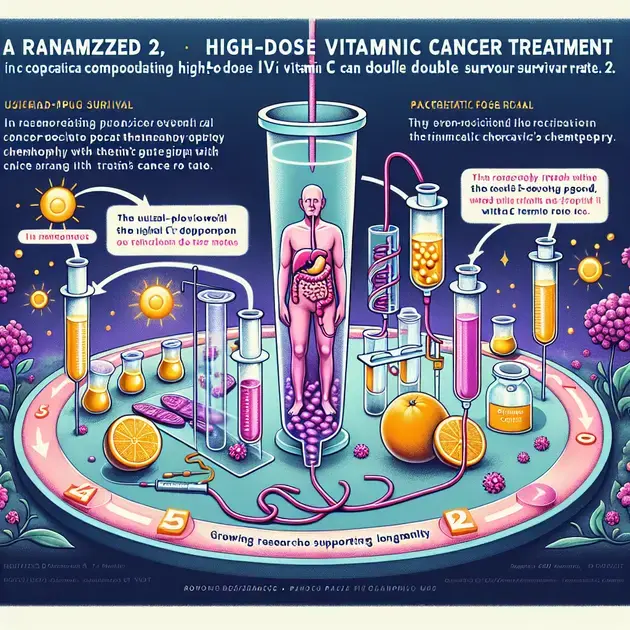Title: Intravenous Vitamin C Doubles Overall Survival in Late-Stage Pancreatic Cancer: A Promising Treatment Approach
Introduction:
In recent years, the potential benefits of high-dose intravenous (IV) vitamin C have gained significant attention in treating various types of cancer. A randomized, phase 2 clinical trial investigating the use of IV vitamin C in combination with chemotherapy for late-stage metastatic pancreatic cancer has yielded remarkable results. This article delves into the study’s findings, highlighting the impact of IV vitamin C on patients’ overall survival.
The Study and its Findings:
The randomized, phase 2 clinical trial involved a group of patients with late-stage metastatic pancreatic cancer. Half of the participants received standard chemotherapy treatment, while the other group received a combination of chemotherapy and high-dose IV vitamin C. The results were truly astonishing. Patients who received the combination therapy exhibited an overall survival rate of 16 months, double that of patients who solely received chemotherapy, where the average survival was only eight months.
Implications for Cancer Treatment:
The findings of this study underline the potential therapeutic value of high-dose IV vitamin C in combination with traditional cancer treatments. Pancreatic cancer is a highly aggressive and challenging form of cancer that often presents at an advanced stage. Thus, any intervention that can offer a substantial survival benefit is of paramount importance.
Mechanisms Behind the Effectiveness:
IV vitamin C functions as a pro-oxidant, generating hydrogen peroxide that can selectively kill cancer cells while sparing normal cells. It also has immune-enhancing properties, which aid in suppressing tumor growth and metastasis. The combination of IV vitamin C with chemotherapy may create a synergistic effect, targeting cancer cells through different mechanisms and improving treatment efficacy.
Advantages of IV Vitamin C:
IV administration of vitamin C allows for higher doses to be delivered directly into the bloodstream, surpassing the limitations of oral absorption. This route of administration achieves significantly higher intravenous concentrations, maximizing its potential therapeutic effects. Moreover, IV vitamin C has shown minimal side effects, offering a favorable safety profile for patients.
Conclusion:
The discovery that the addition of high-dose IV vitamin C to chemotherapy doubles the overall survival of patients with late-stage metastatic pancreatic cancer is a significant breakthrough in cancer treatment. These findings contribute to the growing body of evidence supporting the potential benefits of IV vitamin C in battling cancer. Further research and clinical trials are warranted to elucidate the optimal dosing regimen, treatment duration, and long-term effects for a broader range of cancer types. As the field of oncology progresses, IV vitamin C holds promise as an adjunctive therapy that can improve outcomes and provide hope for patients fighting against this relentless disease.
A randomized, phase 2 clinical trial has demonstrated that incorporating high-dose intravenous (IV) vitamin C into chemotherapy can effectively double the overall survival rate of patients with advanced metastatic pancreatic cancer. Individuals who received this treatment experienced an extended survival period of 16 months compared to the typical eight-month timeframe. This discovery further strengthens the growing body of research supporting the positive effects of high-dose IV vitamin C in cancer treatment.
